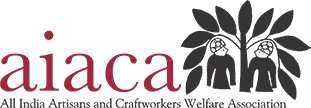
By virtue of being a network, AIACA engages in policy advocacy through research and policy dialogue with multiple stakeholders to bring core issues of this sector to the forefront and discuss practical solutions, as well as address the voices of the artisans and crafts workers themselves.
AIACA works on a two pronged approach wherein it represents artisan clusters and producer organizations; it works with MSMEs in the crafts sector on one hand and operates very closely with a network of industry bodies, buyers, exporters, etc. on the other. AIACA takes a holistic and integrated approach and focusses on economic and social growth, and sustainable livelihood as core issues of development.
Despite being one of the largest employers in India, the crafts sector has not been receiving the policy support it deserves. Dearth of organised data, unavailability of information and the unorganised nature of the sector prevents effective change.The rapidly changing economic scenario within India is creating new threats and opportunities for the handloom and handicraft sectors.
In this backdrop, AIACA works on policy advocacy and research, and development of policy frameworks and reports for the transition of the crafts sector into an organized, entrepreneurial and competitive sector of the mainstream economy that improves income and living standards of artisans and weavers. The Policy Research and Advocacy vertical at AIACA seeks to address the following objectives:
- Identify gaps in the policy regime related to strengthening livelihood security and enhancing income of the craft workers.
- Engage institutions, scholars and practitioners to contribute to research to address these gaps.
- Disseminate information on policy issues through publications, research reports, periodic policy briefs, newsletters, etc.
- Prepare a compendium of government schemes and entitlements relevant for artisans, and actively spread awareness about these to the beneficiaries.
AIACA has successfully worked toward a policy approach and has brought about a shift in the sector from a welfare approach to a more enterprise led approach for growth of craft enterprises. Policy advocacy and strategy development for effective programme implementation are key areas where AIACA has continued to contribute as an apex body in the sector.
Past and Ongoing Initiatives:
- AIACA was a member of the Steering Committee on Handlooms and Handicrafts constituted for the Twelfth Five Year Plan, 2012 -2017.
- AIACA was also a contributor to the Working Group Report on Handicrafts for 12th Five Year Plan.
- AIACA developed a Handicrafts Policy Document for Ministry of Textiles, GoI with a strategic framework for key programmes and interventions.
- AIACA has been nominated a member of the Rajasthan Crafts Council (RCC) chaired by the Chief Minister and provides inputs for state policy and programmes.
- AIACA is regularly invited by the Ministry of Textiles, GoI, to provide specific policy inputs for development, growth and promotion of the handloom-handicraft sector.
- AIACA formed a handloom weaver led enterprise for artisans called Varanasi Weavers & Artisans Society (VWAS), which is a member of the Advisory Committee for the Certificate Course on “Handloom Entrepreneur” by Indian Institute of Handloom Technology (Varanasi) under Ministry of Textiles, GoI. AIACA, through the Varanasi Weavers & Artisans Society, has been invited to support content development and design enhancement of the Course.
- AIACA also carries out several studies and conferences to identify policy issues, and strategies for strengthening the crafts sector as a creative/cultural industry. Extensive research, case study development and development of policy recommendations for Ministry of Textiles, GoI, at different intervals, are regular initiatives by AIACA.
- AIACA orgnaised a national level policy roundtable on the occasion of the launch of the ‘USTTAD Scheme’ by the Ministry of Minority Affairs, in Varanasi. The policy roundtable initiated a multi-stakeholder dialogue on creating an enabling eco system for the crafts sector so that its producers are valued and respected for their skills and they become active stakeholders and beneficiaries of the larger wealth creation process. The broad objective of the policy roundtable was to explore an inclusive and socially responsible approach for supporting producers through the entire value chain, strengthening both production and marketing, and leveraging their traditional skills into internationallycompetitive craft products and enterprises. It was attended by senior government officials and experts from the Crafts sector.
- AIACA continues its policy research and advocacy work on environment, and sustainable consumption and production in the craft sector through the European Union SWTICH- Asia programme and its other initiatives.
AIACA organized a Policy Conference titled “The Crafts Sector: A Green Perspective” to initiate a dialogue on aspects of environmental sustainability, an inherent quality of the Indian handicraft sector. It attracted multi stakeholder participation from government, crafts enterprises, markets, designers, international bodies such as European Union, and other important stakeholders. The deliberations were based on the premise that the handicrafts and handloom sectors of India are essentially and traditionally environment friendly and carry the USP of being local, indigenous, culturally rooted, socially and economically enabling for the communities who have held these knowledge systems for centuries.
